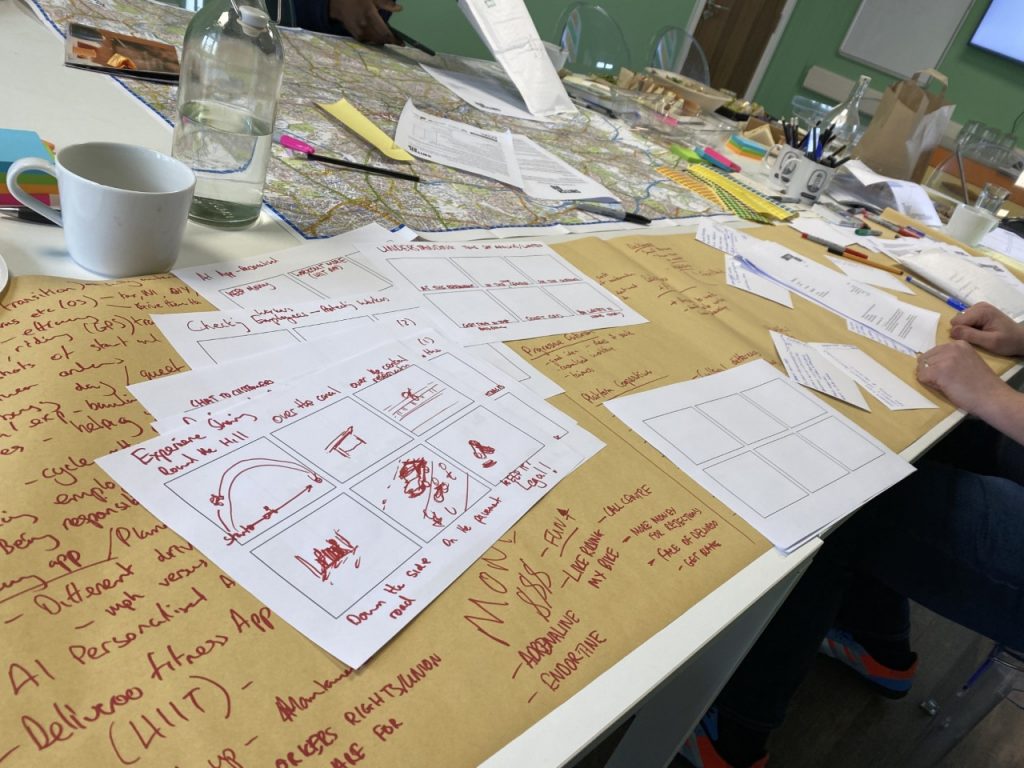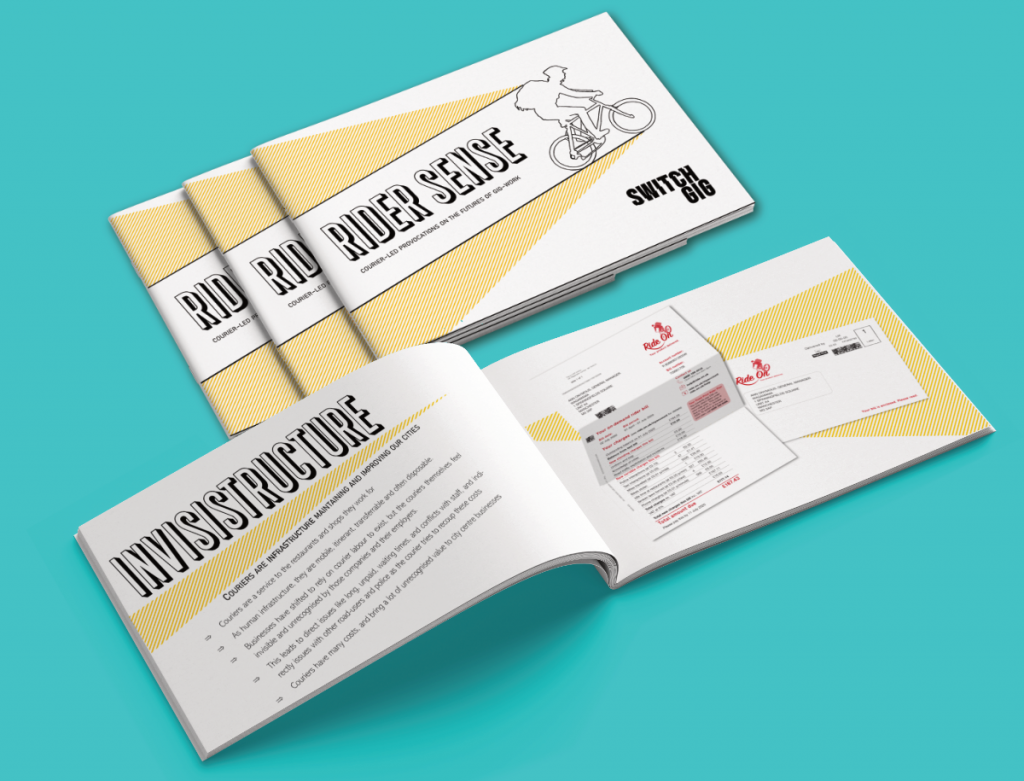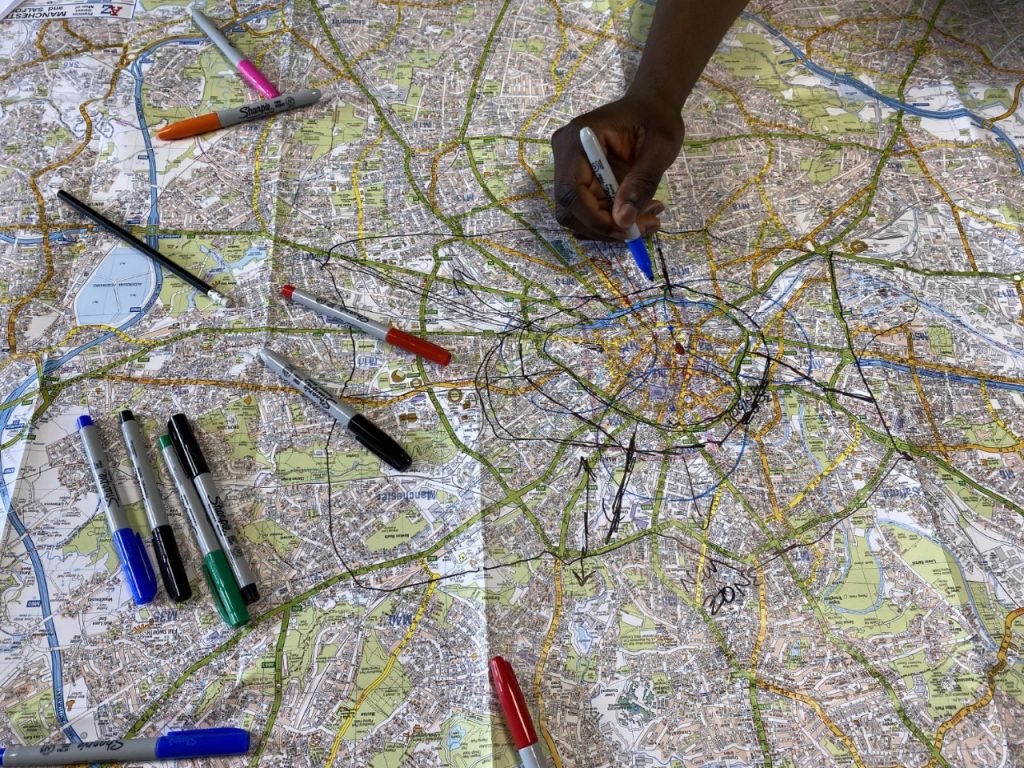Exploring digital opportunities to switch the gig-economy to fair and just work
Project Lead

Dr. Ben Kirman
Lecturer in Interactive Media, Theatre, Film and Television Department, University of York
Contact: ben.kirman@york.ac.uk
Co-Investigators
Dr Oliver Bates, Lancaster University
Supporting Partner(s)
Co-operatives UK, Miralis Data, Future City Logistics
Challenge
In 2019, Britain’s gig economy doubled over three years accounting for 4.7 million workers. However, these digital platforms have created a precarious nature of employment, where working people run the risk of battling to make ends meet, according to the TUC and academics at the University of Hertfordshire.
Switch-Gig explored the question: “How can we co-design technological innovations to support workers themselves, shifting the focus of gig work towards just work, and empowerment for workers?”
The project ran workshops with groups of food delivery couriers from York and Manchester to explore how we can co-design technological innovations to support and empower gig workers.
Supporting the needs of gig-workers
Switch-Gig pulled together the experiences of the couriers’ relationships with technology in a design booklet. The project was also an extremely valuable pilot for understanding how to run this kind of research with couriers in the future.
The outcomes of this pilot project will inform larger-scale projects to support the needs of, and address the issues faced by, gig-workers, both within the lifestyle courier community and beyond, both in the UK and abroad.
Recruitment across cities
Researchers recruited couriers’ via flyering in both York and Manchester. However, while in York this only took one day to get enough participants, in Manchester this took a few weeks. This was due to York having one centralised WhatsApp group for the couriers, while due to its size there did not seem to be an equivalent for Manchester
Workshops and design fiction
They paid the riders living wage for a full day’s work sharing experiences and developing ideas at the workshop, which was key to getting people to take part. The project team ran workshops for the couriers discussing their experiences of technology, and creating design-fictions on projects that could turn their ‘gig work’ into just work.

The workshops took place in early March, this was before the national lockdown however some participants did not show up due to fears around COVID-19 and they had to recognise the limits of who they were able to reach when talking about economically marginalised groups.
They decided to explicitly not include industry partners in the workshops themselves, so people would feel more comfortable talking freely.
Outcomes
Relationships with technology
Technology is at the heart of the couriers’ work. They rely on apps to tell them where to work, and some use e-bikes to travel around to make deliveries. Many carry extra battery packs and cables necessary for potentially long shifts.
They found the couriers, who often worked for more than one service, regarded the delivery apps with some suspicion. They were concerned about the information that the apps were gathering, and found the opacity of the app’s working frustrating. For example one platform does not tell the courier how far they will have to travel, another will add second orders without notice.
Designing future ‘gig work’
Through speculative fiction, the groups came up with several project ideas which we used to create the Switch Gig design booklet.
Couriers’ role as “local heroes” and essential “key workers”, represented by their inclusion on a statue to celebrate emergency service workers.
Couriers as infrastructure, represented by an invoice to a restaurant that details the cost of maintenance of infrastructure (stolen bikes, new batteries, etc).
Couriers’ livelihoods at the whim of opaque unknowable systems, represented by a service that gives tarot readings to see who the algorithm will favour.
Couriers seizing power, solidarity platforms and working together to share knowledge.
Couriers as deviants – obliged to appropriate and subvert the infrastructure of the city to make a living.
You can download a copy of the booklet here.
Oliver Bates was interviewed in Wired Magazine about the project, you can read it here ‘Academics are trying to fix the last mile gig economy.’
Future Directions
From the engagement with the workers and the industry partners, it looks like there is limited number of existing initiatives to help couriers change their work, short of starting their own business, as policy makers aren’t engaged and the union has limited scope for impact mostly focusing on case work to help individual workers who have faced unfair dismissal. There are certainly opportunities in this gap that can offer support to individual workers with limited time and expertise.

In addition, the project was successful in getting funding as part of the EPSRC Telling Tales of Engagement programme. They are working on a card game and other activities that will share the impact of the work conducted during Switch-Gig and the sister project Flip Gig.
The game is a way of communicating the invisible and unexpected challenges couriers face in their work, but in an accessible and light way. The aim is to complement and support activities from unions such as the IWGB in communicating these issues to the public.
Papers
Sustainable Platform Cooperativism: Towards social and environmental justice in the future of the gig-economy. Limits 2019.
Let’s start talking the walk: Capturing and reflecting on our limits when working with gig economy workers. Proceedings of the 7th International Conference on ICT for Sustainability, 227–235.
The future of techno-disruption in gig economy workforces: Challenging the dialogue with fictional abstracts. Proceedings of the Halfway to the Future Symposium 2019, 1–4.
Lessons from one future of work: opportunities to flip the gig economy. IEEE Pervasive, Special Issue on The Future of Work: COVID-19 and Beyond, 2021.

